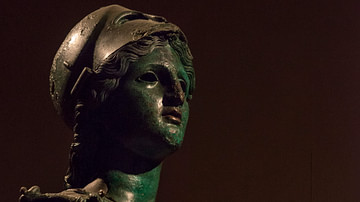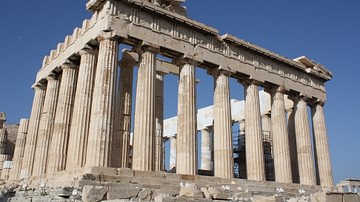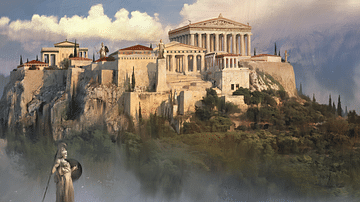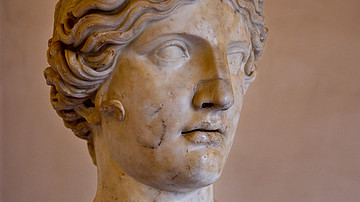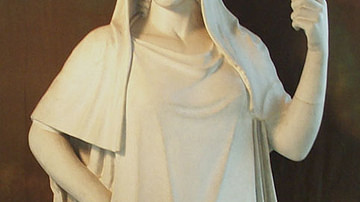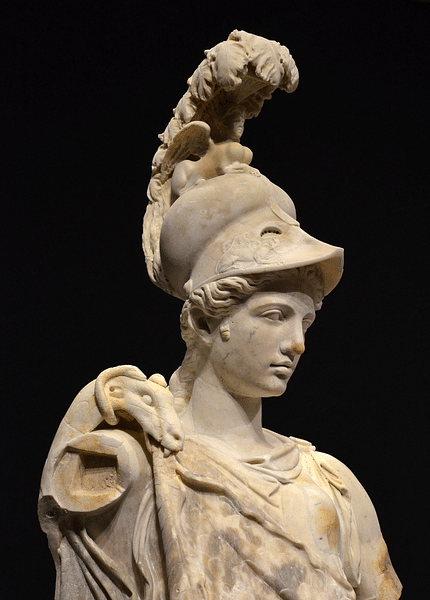
Athena was the goddess of wisdom, war, and the crafts. She was the favourite daughter of Zeus and was, perhaps, the wisest, most courageous, and certainly the most resourceful of the Olympian gods.
Zeus was told that his son would take his throne from him, just as he had taken power from his father Cronus. Accordingly, when Metis was pregnant, he swallowed her and Athena was born from Zeus' head, wearing armour and fully grown. A popular theme in ancient Greek art, Hephaistos is often depicted in the role of midwife, splitting Zeus' head with an axe. Athena is often cited as Zeus' favourite child.
Athena's Epithets
Epithets of Athena include Pallas (girl) and Parthenos (virgin), living up to which, she is conspicuous amongst the gods of Greek mythology for not indulging in illicit relationships with other divinities, demigods, or mortals. Other epithets were Promachos (of war) - perhaps referring to more patriotic, defensive, and strategic warfare, rather than attacking warfare, in contrast to her more aggressive, conflict-loving brother Ares, Ergane (of the crafts), and Nike (victory). Nevertheless, the goddess was noted for her military prowess.
The goddess was not to be trifled with as her transformation of Medusa into a Gorgon demonstrates, and her sense of justice was such that acts of impiety were swiftly avenged, as with the Achaean heroes following their capture of Troy and desecration of the goddess' sanctuary.
Athena is also the patron goddess of household crafts, giving mortals the gifts of cooking and sewing. She is said to have invented the aulos but on seeing her reflection and her puffed cheeks when playing these pipes, she threw them away, to be picked up by the satyr Marsyas.
Athena & Athens
She is closely associated with Athens, the city named in her honour after the people of Attica chose her as their patron following her gift of the olive tree, symbol of peace and plenty. The 5th century BCE temple of the Parthenon, which continues to this day to dominate the acropolis of the city, was built in her honour. Her adopted son Erichthonios, one of the first kings of Athens, is traditionally credited with inaugurating the Panathenaic festival, held every four years to honour the goddess. The festival included a magnificent procession through the city, the presentation to Athena of a specially woven peplos (depicting the Gigantomachy), and athletic games. Prizes for the games were amphorae painted with a figure of Athena and contained prime olive oil. In her role as protector, she was also revered in many other major cities, notably as patron of Sparta, as the founder of Thebes in Boeotia, and at Corinth where she appeared on the city's coins.
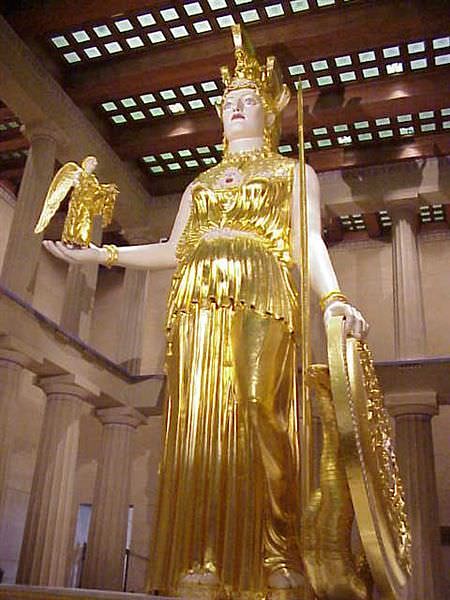
Athena & the Greek Heroes
In the Greek myths, she is the protector of Hercules and Athena often aids him in his twelve labours, for example, by helping him hold the world as Atlas searches for the sacred apples of the Hesperides. Perseus was another favourite and was given a shield to protect himself in his quest to kill Medusa. Achilles is helped to kill Hector, and Odysseus too was often given the benefit of Athena's wisdom, for example the idea to dress as a beggar on his return to Ithaca, and he is also protected from the arrows of his rivals when he clears the palace of the interlopers. Jason was yet another hero who benefitted from Athena's resourcefulness when she encouraged Argo to build the first Greek longship which would carry his name and the fame of the Argonauts.
Athena was a major protagonist in Homer's account of the Trojan War in the Iliad where she supports the Achaeans and their heroes, especially Achilles, to whom she gives encouragement and wise counsel, Menelaos, who is saved from the arrow of Pandaros, and Diomedes, whose spear, in one notable episode, is diverted to injure Ares himself. Aphrodite was another divinity who came off second best when she clashed with Athena. She also gave protection to Odysseus and is credited with giving him the idea of the Wooden Horse. Both Homer and Hesiod refer to Athena as 'bright-eyed' and 'Tritogeneia'. She is also frequently called 'goddess of spoil', the 'lovely-haired goddess', and 'Alalkomenaian Athena'.
What Objects Are Associated with Athena?
Objects associated with the goddess include an owl - symbol of wisdom - and the olive tree. She is often depicted in art with armour, a golden helmet, a shield, and holding a spear. Her armour is the aegis made, in some accounts, from the skin of a Giant, hung with tassels of gold, and featuring the head of the Gorgon given to her by Perseus. The most famous representation of Athena in the ancient world was undoubtedly the monumental gold and ivory statue of the goddess by Pheidias which resided in the Parthenon of Athens and was over 12 m high. The statue has been lost but survives in the form of smaller Roman copies and shows Athena standing majestic, fully armed, holding Nike in her right hand and with a shield in her left depicting scenes from the Battles of the Amazons and the Giants. On her helmet were a sphinx and two griffins. Celebrated surviving depictions of Athena include friezes from the Parthenon and metopes from the temple of Zeus at Olympia.
